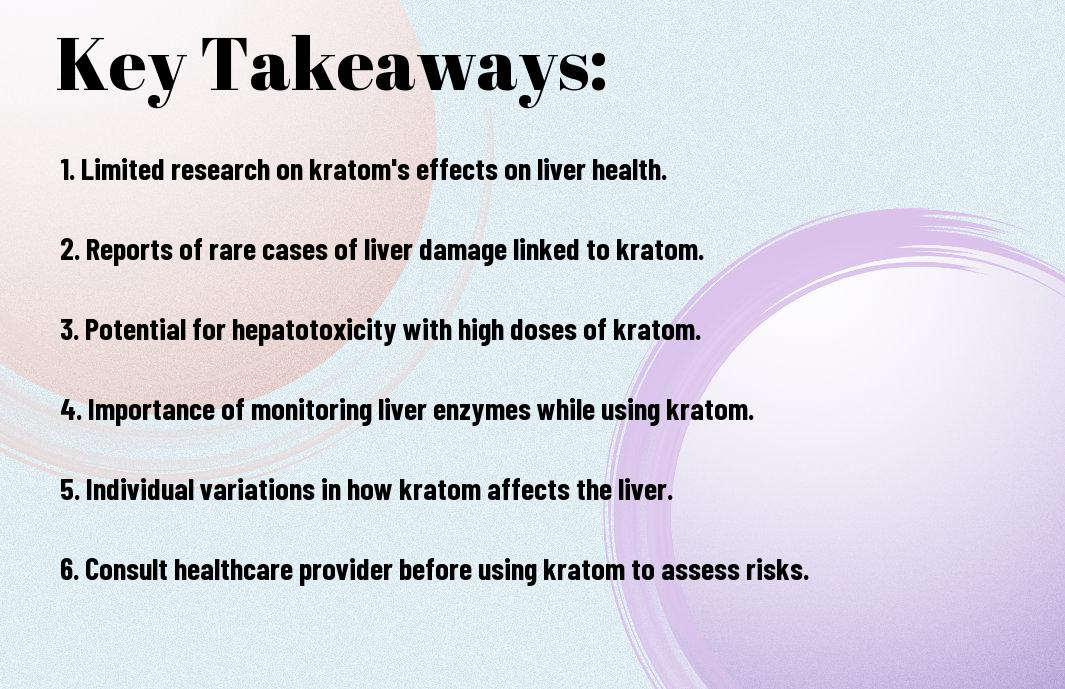Overexposure to kratom can have adverse effects on the liver. Research suggests that kratom, a popular herbal supplement, can lead to hepatotoxicity in some cases. Understanding the potential impact on liver health is crucial for those who consume kratom regularly. This article examines into the scientific evidence regarding kratom’s effects on the liver, shedding light on an important aspect of this controversial plant.
Key Takeaways:
- Kratom can have adverse effects on the liver: Studies have shown that kratom consumption can lead to liver damage, including hepatitis and cholestasis.
- Individual reactions may vary: While some individuals may experience liver issues from using kratom, others may not have any adverse effects at all. It’s crucial to monitor liver health when using this substance.
- Caution is advised: Due to the potential risks associated with kratom and its effects on the liver, it’s crucial to use this substance responsibly and consult with a healthcare professional if any concerning symptoms arise.

Kratom Basics
What is Kratom?
Kratom is a tropical tree native to Southeast Asia, belonging to the coffee family. Its scientific name is Mitragyna speciosa. The leaves of the kratom tree have been used for centuries for their medicinal properties and are commonly consumed by brewing them into a tea or chewing them for their stimulant effects. Kratom is also known for its potential pain-relieving and mood-enhancing properties, making it a popular natural remedy in various cultures.
History and Traditional Use
For centuries, kratom has been used in traditional medicine practices in Southeast Asia, particularly in countries like Thailand and Malaysia. It has been utilized to boost energy levels, alleviate pain, and improve mood. It has also been traditionally used during religious ceremonies and social gatherings due to its stimulating effects. However, it is important to note that kratom has also been associated with potential side effects and risks, especially when used in high doses or in combination with other substances.
Liver Function and Health
The Role of the Liver in the Body
If you’re wondering about the impacts of kratom on liver function, it’s crucial to understand the vital role the liver plays in the body. The liver is a powerhouse organ responsible for processing nutrients, detoxifying harmful substances, producing bile to aid in digestion, and regulating blood sugar levels. Without a healthy liver, our bodies would struggle to function properly. The liver is resilient and can regenerate itself to some extent, but prolonged exposure to harmful substances like certain medications, alcohol, or toxins can lead to liver damage.
Common Liver Problems and Diseases
To research deeper into the potential effects of kratom on liver health, it’s crucial to explore common liver problems and diseases. One of the most common liver conditions is fatty liver disease, which can result from excessive alcohol consumption, obesity, or even certain medications. In more severe cases, fatty liver disease can progress to more serious conditions like hepatitis, cirrhosis, or liver cancer. It’s crucial to monitor liver health and address any issues promptly to prevent long-term complications.
An understanding of common liver problems and diseases can help individuals make informed decisions about their health, including the use of substances like kratom. While the research on kratom’s effects on the liver is ongoing, it’s crucial to prioritize liver health and consult healthcare professionals if any concerning symptoms arise.

Kratom’s Impact on Liver Enzymes
Cytochrome P450 and Kratom Interactions
For many individuals, the concerns surrounding kratom use revolve around its potential interactions with the liver enzymes, specifically the Cytochrome P450 system. This system is responsible for metabolizing a wide range of medications and substances in the body, including kratom.
With kratom being metabolized by the Cytochrome P450 enzymes, there is a risk of drug interactions when kratom is taken alongside other medications that are metabolized by the same enzymes. This could potentially lead to decreased effectiveness of certain medications or an increased risk of side effects due to altered metabolism.
Alkaloids and Liver Enzyme Inhibition
Any inhibition of liver enzymes by kratom’s alkaloids could have significant consequences on the metabolism of other drugs or substances in the body. Kratoms are known to contain various alkaloids that could potentially interact with the liver enzymes and impact their function.
Alkaloids found in kratom can inhibit specific liver enzymes, leading to delayed metabolism of other substances in the body. This could result in accumulation of these substances to potentially dangerous levels and increase the risk of adverse reactions.
Reported Liver Damage and Toxicity
Not How Hard is Kratom on the Liver: Assessing its Impact
Acute Liver Failure and Kratom Use
To date, there have been several reported cases of acute liver failure linked to kratom use. While these instances are rare, they are concerning due to the severity of the outcomes. Acute liver failure is a serious condition that can result in life-threatening complications and the need for immediate medical intervention. Some individuals may be more susceptible to this adverse effect, highlighting the importance of understanding the potential risks associated with kratom consumption.
Chronic Liver Disease and Kratom Abuse
Kratom abuse has also been associated with the development of chronic liver disease in some individuals. Chronic liver disease is a progressive condition that can lead to liver cirrhosis, liver failure, and other complications if left untreated. It is crucial for individuals who use kratom regularly to be aware of the potential impact on liver health and to monitor their liver function regularly through medical check-ups.
Understanding the potential risks of liver damage associated with kratom abuse is crucial for promoting safe consumption practices. It is important for individuals to be aware of the signs of liver damage, such as jaundice, fatigue, and abdominal pain, and to seek medical attention if they experience any concerning symptoms. Additionally, maintaining open communication with healthcare providers can help individuals make informed decisions about kratom use and monitor their liver health effectively.
In the aggregate, while kratom can offer various benefits for some individuals, it is crucial to recognize and address the potential risks it may pose to liver health. By staying informed and attentive to changes in health, individuals can mitigate these risks and promote overall well-being.
Risk Factors and Vulnerable Populations
All individuals who consume kratom need to be aware of the potential risks associated with its use. However, certain groups may be more vulnerable to experiencing adverse effects due to a variety of factors.
Age, Health Status, and Kratom Use
For older adults and those with underlying health conditions, the effects of kratom on the liver can be more pronounced. Age-related changes in metabolism and liver function can impact the body’s ability to process and eliminate kratom compounds effectively. Additionally, individuals with pre-existing liver conditions may be at higher risk of experiencing liver damage when consuming kratom regularly.
Polypharmacy and Drug Interactions
The use of multiple medications, known as polypharmacy, can increase the risk of drug interactions when kratom is introduced into the mix. Certain medications may interfere with the liver’s ability to metabolize kratom compounds, leading to potential toxicity or other adverse effects.
To minimize the risks associated with kratom use, individuals should be cautious when combining kratom with other medications and consult with a healthcare professional to ensure safety and efficacy.
What are the Potential Effects of Kratom on the Liver?
Kratom and liver health are a subject of concern as some studies suggest a potential link between kratom use and liver damage. While more research is needed, it’s important to be cautious and mindful of the possible effects kratom may have on the liver.
Mitigating Liver Damage from Kratom Use
Safe Dosage and Administration Guidelines
On your journey to enjoy the purported benefits of kratom, remember that responsible usage is key to safeguarding your liver health. Keeping to safe dosage and administration guidelines is of paramount importance. It is advised to start with a low dosage and gradually increase until the desired effect is achieved. The recommended maximum dose is around 2-8 grams, taken no more than twice a week.
Monitoring Liver Function and Health
With regular usage of kratom, it is imperative to monitor liver function and health closely. Liver toxicity can often be asymptomatic, so routine blood tests to check liver enzymes are highly advisable. If you experience any symptoms of liver issues such as jaundice, dark urine, or abdominal pain, it is crucial to seek medical attention promptly.
Function tests should be done periodically to ensure the liver is not undergoing undue stress or damage from kratom use. Consulting with a healthcare provider before and during kratom use can provide valuable insights into how your liver is responding to this herb. Do not forget, your liver is a vital organ that must be protected.
Conclusion
Taking this into account, it is important for individuals using kratom to be aware of the potential effects on the liver. While more research is needed to fully understand the impact of kratom on liver health, it is crucial to use this herbal supplement with caution and moderation. Consulting with a healthcare provider before incorporating kratom into your routine can help assess any potential risks and monitor your liver function regularly.
In the long run, the relationship between kratom and liver function is still being studied, and it is crucial to approach the use of this supplement with diligence and care. By staying informed and taking necessary precautions, individuals can continue to enjoy the potential benefits of kratom while safeguarding their liver health.
FAQ
Q: What is Kratom?
A: Kratom is a tropical evergreen tree native to Southeast Asia, known for its medicinal properties and psychoactive effects. It is commonly used as a recreational drug and for pain relief.
Q: How does Kratom affect the liver?
A: Kratom contains alkaloids that can be hepatotoxic, meaning they have the potential to cause liver damage. Chronic use of kratom has been associated with liver injury.
Q: What are the symptoms of liver damage from Kratom?
A: Symptoms of liver damage from kratom may include jaundice (yellowing of the skin and eyes), dark urine, fatigue, nausea, and abdominal pain.
Q: Can Kratom cause liver failure?
A: In rare cases, kratom use has been linked to severe liver injury and even acute liver failure. It is important to monitor liver function regularly if using kratom long-term.
Q: How can the risk of liver damage from Kratom be minimized?
A: To minimize the risk of liver damage from kratom, it is recommended to use it in moderation, avoid combining it with other hepatotoxic substances, and monitor liver function through regular blood tests.










